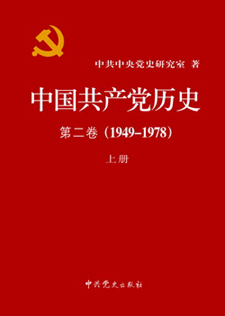
管理員
 This week, the official History of the Communist Party, Volume 2 was published after sixteen years of painstaking research and countless rewrites. The volume spans the 29 years from 1949 to 1978, covering the Great Leap Forward, the famines of the early 60s, and the turbulent period of the Cultural Revolution.
This week, the official History of the Communist Party, Volume 2 was published after sixteen years of painstaking research and countless rewrites. The volume spans the 29 years from 1949 to 1978, covering the Great Leap Forward, the famines of the early 60s, and the turbulent period of the Cultural Revolution.
While reading the China News Weekly interview with Zhang Qihua, the CPCCP director of Historical Research, I ran acrosss something he said that made me rather uneasy.
On the whole, Mr. Zhang's comments are admirable. He acknowledges that the party, and the country itself, must come to terms with its recent history and that writing an honest historical narrative means admitting that the policies of the Great Leap Forward and the Cultural Revolution were mistakes.
But Mr. Zhang surprisingly insists that "the focus should not be on individuals, not even Mao Zedong." He says that this is the history of the Party itself, and to allocate blame on individuals is "not how history should be written."
I would like to compare Mr. Zhang's perspective on history with that of another historian. I am halfway through Frank Dikotter's ground breaking book Mao\'s Great Famine, an account of Great Leap Forward which incorporates volumes of new research from provincial and local archives.
The title of Mr. Dikotter's book is more or less his thesis. The famines of the Great Leap Forward and the tens of millions that died as a result were not the result of complex international politics and unfortunate natural disasters, they were the direct consequences of manmade policies. More specifically, they were the direct consequences of one man’s unprecedented and unrivaled political power the population of a billion.
I am not suggesting that Mr. Dikotter's book is the last word on an impossibly complex historical period, although he does present extensive research with care and narrative skill. I also understand that an "official" history of the CCP is unlike to produce any earthshattering conclusions.
But I do think Mr. Zhang Qihua's comments, in light of the recent work done by western scholars and the absence of authoritative scholarship on the period, raise an interesting question about what type of history we can accept as "objective," and what we accept to be "truth."
The wide spectrum of contemporary scholarship has called into question much we may at one point have taken for granted. Should history focus on individuals? Should it allocate blame?
Mr. Zhang is adamant that we cannot make judgments about people in retrospect, beyond their specific historical context. This comment is an echo of the sentiment voiced by state historians and officials for nearly two decades.
But I find this view absurd.
That individuals were limited by the conditions of their time is a banal observation. To use this to absolve historical figures of moral responsibility is a cheap denial of their capacity for judgment.
Mao was ruthless with dissenters and careless with the populations at his disposal. Policy makers at every level were confronted with irrefutable evidence of the mounting death toll. Countless deaths during the famines and the political purges of the Cultural Revolution were the direct product of petty rivalries and personal vendettas.
These were not accidents, and they are not moral ambiguities.
History invites us to make judgments, and we cannot make judgments except in retrospect. Asking us to refrain does a disservice to the past.
The claim that we should not judge our political leaders based on historical evidence is irresponsible, and utterly antithetical to the project of "coming to terms with the past."
Further Reading
China National Radio:《中國共產(chǎn)黨歷史》第二卷正式出版 全書近100萬字
China News Service: 中共《黨史》二卷問世 客觀評價(jià)建政前29年功過
The Economist: Life of the Party
China Communist Party History Publishing House: Official Site
The Guardian: Mao\'s Great Famine by Frank Dikotter